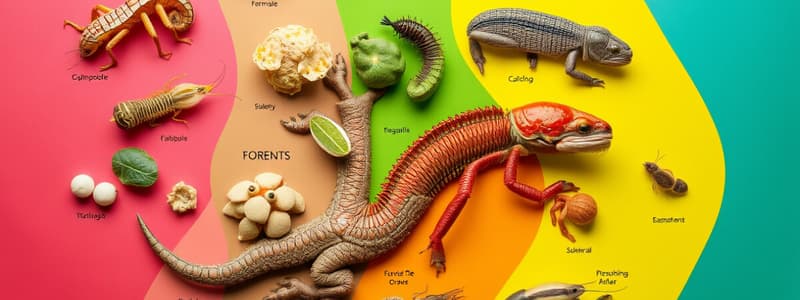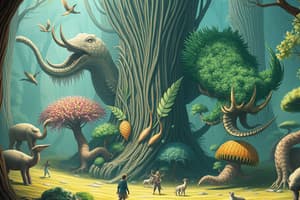Podcast
Questions and Answers
What does the Animalia kingdom consist of?
What does the Animalia kingdom consist of?
- Plant-like organisms
- Unicellular organisms
- Organisms that can make their own food
- Multicellular organisms that can move (correct)
What organisms are primarily included in the Monerans kingdom?
What organisms are primarily included in the Monerans kingdom?
Bacteria
Who discovered cells by looking at cork under a microscope?
Who discovered cells by looking at cork under a microscope?
Robert Hooke
What characteristics do organisms in the Fungi kingdom have?
What characteristics do organisms in the Fungi kingdom have?
What process do Plantae organisms use to make their own food?
What process do Plantae organisms use to make their own food?
What type of organisms does the Protista kingdom include?
What type of organisms does the Protista kingdom include?
Who developed the first classification system?
Who developed the first classification system?
Bacteria are considered the oldest life form on Earth.
Bacteria are considered the oldest life form on Earth.
What substance adds rigidity and structural support to fungi cells?
What substance adds rigidity and structural support to fungi cells?
Flashcards are hidden until you start studying
Study Notes
The 5 Kingdoms - Classification
-
Animalia (Animal Kingdom): Comprises multicellular organisms; they can move and do not produce their own food, consisting of animal cells.
-
Monerans Kingdom: Includes unicellular organisms primarily made up of bacteria; these organisms absorb nutrients from external sources and can be beneficial or harmful.
-
Robert Hooke: Notable for discovering cells by examining a thin slice of cork under a microscope, laying the groundwork for cell theory.
-
Fungi Kingdom: Mostly constituted of multicellular organisms that cannot synthesize their own food. Features include a cell wall, stem, and roots; examples are mushrooms and bread mold, with yeast as a unicellular variant.
-
Plantae (Plant Kingdom): Organisms possessing chloroplasts that create food through photosynthesis. They are multicellular, eukaryotic, autotrophic, and typically green.
-
Protista Kingdom: Encompasses single-celled organisms that do not fit in the plant or animal categories. Some perform photosynthesis, while others ingest food through absorption; examples include Euglena, Paramecium, and Amoeba.
-
Aristotle: An early philosopher who formulated the first formal classification system, distinguishing only between plants and animals.
-
Bacteria: Considered by scientists to be the oldest life forms on Earth, playing a crucial role in ecosystems.
-
Chitin: A crucial substance that provides rigidity and structural support; found in the exoskeletons of spiders and insects as well as in the cell walls of fungi, contributing to the texture of mushrooms.
Studying That Suits You
Use AI to generate personalized quizzes and flashcards to suit your learning preferences.




